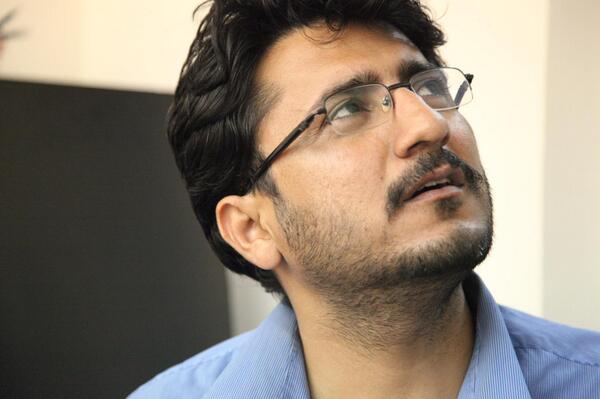The Turbat-born Baloch writer and film director is not the world’s top social media influencer, but he is arguably Balochistan´s most well-known face with a wide-ranging social media outreach. A Baloch would already know we are referring to Dr Haneef Shareef, for there is no one else from Balochistan with such an intellectual background so active on the social media.
Every day, he gets together with another refugee colleague based in Germany to record a broadcast for their internet radio portal — Radio Balochistan. And people are beginning to love them.
He has virtually tapped into the power of social media to stir discussions considered taboo among the Baloch. His target audience are millions of Baloch scattered in several countries throughout the world. His talks may range from women´s right, politics, freedom, human rights, and his own unrequited love.
Often, he would just read out an ‘unwritten” letter to a “missing person” picked up by the Pakistan military, with the moral of surviving at any cost at the face of injustice. Whatever the subject might be, his narratives are woven with literary scent, a skill he acquired as a story writer.
Shareef, a physician by training, began his creative career as a Balochi short story writer in the 1990s, which in his case was not a smooth sail to fame. It was due to one of his short stories that he was accused of committing blasphemy in 2000.
In Pakistan, even false accusations of blasphemy, may lead to murder. However, he was lucky enough to survive the blasphemy charges and complete his medical training.
His luck even did not let him down when he was enforced disappeared in 2005 for expressing his political and social views. He was among the few Baloch to return home alive after a grueling nine months of torture in Pakistani secret dungeons. His family, friends, literary groups and political parties had launched a successful protest campaign for his release.
He told Balochistan Times that the main reason behind his broadcasts is to bring about the stories from Balochistan, and get connected with his homeland as well as the growing number of the Baloch living in exile.
Due to growing religious intolerance in Pakistan — and as a result in Balochistan — discussing taboo subjects is a risky endeavor. In 2015, a man claiming to represent Tehreek e Taliban Afghanistan sent out audio threats to him and another Balochi writer for allegedly running a blasphemous Facebook page.
The men claimed in the audio messages that they have received information that Dr Naguman and Shareef were running “this blasphemous campaign”.
Both Naguman and Shareef have rejected the accusation.
Shareef often uses the radio medium to snare people into reading and provoke intellectual debate. We asked him if he was of the belief that people were straying away from books.
“The reading culture, in general, is not in decline in Balochistan but reading of certain books is in decline due to governments censorship and I happen to be the type of person who wants to promote those books. The books that adhere to a virtuous narrative and try to show the real face of our society are being systematically banned for the public. The publishers don’t want to risk persecution by publishing them. The booksellers do not want to risk persecution by selling them.”
This is even true for his own books which are not available to the public due to undeclared government censorship. People can even face persecution if found in possession of Shareef’s books.
“That’s why, social media and Radio Balochistan’s Youtube channel are my best bet to reach my audience. The numbers on our channel show that there is a tremendous response from within Balochistan despite the limited access to internet.”
But he does not intend to stop there. “I plan to go one step further and establish a Balochi language TV channel, perhaps initially on the internet. It will be an open platform to discuss literature, culture, politics, films, science, fiction and everything else which needs to be discussed.”
Shareef understands the risk involved in running such a project, especially if it is about Balochistan. Not long ago, someone from Balochistan tried to launch a television channel and ended up being picked up by the military.
“I know what the risks are, but there are things that need to be done, and I am going to do them at all costs,” he stressed.



